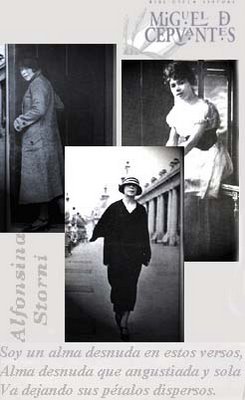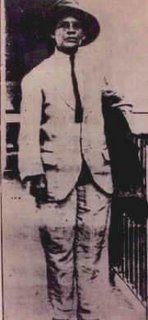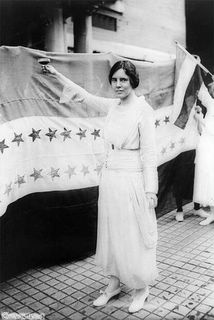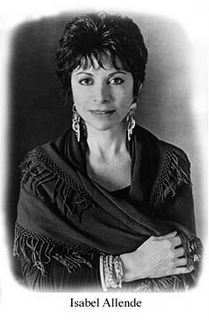Alfonsina Storni
 The struggle against discrimination, prejudice and double standards has been long for women. Latin American culture has been known to be a sexist culture. However, many incredible women have struggled to overcome the sexist whiplash of the Hispanic culture. Alfonsina Storni was one of the famous female writers of the Hispanic community. She gave women a voice in a time that women had none.
The struggle against discrimination, prejudice and double standards has been long for women. Latin American culture has been known to be a sexist culture. However, many incredible women have struggled to overcome the sexist whiplash of the Hispanic culture. Alfonsina Storni was one of the famous female writers of the Hispanic community. She gave women a voice in a time that women had none.Born in April of 1892, Alfonsina was the third of four children born to Paulina and Alfonso Storni. Due to her father’s alcoholism, her parents left San Juan, Argentina, where they had a prominent business manufacturing soda, ice and beer, and they moved to Switzerland where Alfonsina was born. When Alfonsina was four years old they moved back to San Juan, Argentina and then to Rosario. Seven years later, her parents had their fourth child. Shortly after the birth of her younger brother, her family’s business declined and went into bankruptcy. In order to provide for her family, Alfonsina’s mother, Paulina, wanted to run a small private school; however, her father wanted to start a Café. Alfonso Storni’s café also ended in failure placing an even greater dent in his family’s economy.
When Alfonsina was only eleven years old, she began writing and contributing to her family. She toured Argentina at twelve and later she went back to school and received a diploma in teaching. Alfonsina taught at Rosario where she fell in love with a married newspaper journalist. This romance produced a child and, due to this, Alfonsina left Rosario because her lover’s reputation was in jeopardy. She moved to Buenos Aires where her son was born in 1912. Soon after, while working at an oil importing firm where she held a high position, she wrote La Inquietud del Rosal ("The Disquietude of the Rosebush"-1926). This was her first book of poetry filled with poems of love and politics. Because Alfonsina was unmarried, her book was considered scandalous and caused her to loose her job at the oil importing firm. She soon gained another job as a teacher.
Alfonsina held a chair in El Teatro Infantile Municipal Labarden 1921 and the Nacional de Música y Declamación in 1923. She became a "Lectura y declamación" profesor at the Escuela Normal de Lenguas Vivasen 1923.
Alfonsina published several other books such as El amo del Mundo ("The Master of the World"- 1927), Ocre ("Okra"- 1925), Poemas de Amor ("Love Poems"- 1926), Mundo de Siete Pozos ("World of Seven Wells"- 1934), and Mascarilla y Trebol ("Mask and Clover"- 1938).
In 1935 she was diagnosed with breast cancer and had to go through painful operation that did not improve her condition. She suffered from severe depressions that led to her drowning herself in the ocean on October of 1938. Her last poem was "Voy a Dormir" (I Am Going to Sleep).
Though her poetry, articles and essays, Alfonsina advocated for equality and “balance” between men and women. Even though she gave up and defeated herself in the end, it was the openness, independence, and self reliance she had during her life that set her apart from the women of her time and gave us a model of the intellectual woman for the generations to come.
Books by Alfonsina Storni:
La inquietud del rosal
El dulce diario
Irremediablemente
Languidez
Ocre
Mundo de siete pozos
Poemas de amor
Books about Alfonsina Storni:
Alfonsina Storni
Sonia Jones
Alfonsina Storni: From Poetess to Poet
Rachel Phillips
Alfonsina Storni
Jose D. Fogione
Poemas de amor
Books about Alfonsina Storni:
Alfonsina Storni
Sonia Jones
Alfonsina Storni: From Poetess to Poet
Rachel Phillips
Alfonsina Storni
Jose D. Fogione




